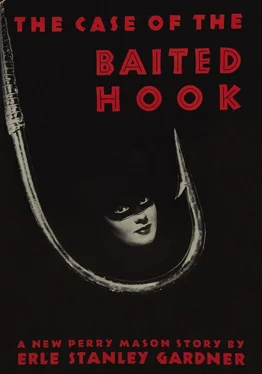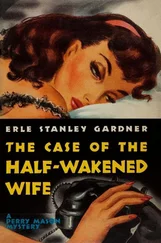“How do you figure it?”
“I figure he was shot in the automobile and came into the apartment under his own power — probably with quite a bit of assistance. He died practically as soon as he was stretched out on the bed… Funny thing, Paul, about his shoes.”
“What’s funny about them?”
“They weren’t on.”
“Well, a man wouldn’t get into bed with his shoes on.”
“A dying man wouldn’t stop to take his shoes off. If someone was helping him in, that someone would hardly think to take the shoes off — unless it happened to be a woman.”
“Something to that,” Drake agreed.
“The boys from the Homicide Squad couldn’t find those shoes,” Mason said. “I looked around for ’em myself when I was in there. I didn’t see them in the closet, and didn’t see them under the bed.”
“Why would anyone take his shoes?”
“I don’t know, but I have an idea.”
“What’s the idea?”
Mason said, “Let’s look at it this way, Paul. The autopsy surgeon says he’s been dead some time. He figures ten o’clock Tuesday morning as the very latest. I have an idea he’d like to put it quite a bit before that, but in view of the other evidence, he’s stretching things to the limit.”
“That gas being on and the room being closed up didn’t help things any,” Drake pointed out.
“I know, but that’s a significant thing in itself.”
“How do you mean, Perry?”
Mason said, “Let’s look at it this way, Paul. Tidings might have gone into the house under his own power. It might have been during the daytime… But there are quite a few things which make me think otherwise. One of them is the gas.
“I don’t think that the gas was turned on simply to create conditions which would cause a more rapid decomposition of the body and make it more difficult to fix the time of death with any degree of accuracy.”
“Why was it turned on then?” Drake asked.
Mason said, “It was turned on because it was cold in the room. Whoever turned it on wanted to heat the room. That means it was turned on at night.”
“Tuesday night?” Drake asked.
Mason said, “No, Paul. Monday night.”
Drake stared at him. “Monday night! But that’s impossible!”
Mason said, “Let’s look at it this way, Paul. It was either Monday night or Tuesday night. The man wasn’t dead when he was brought into the house. The bloodstains on the floor indicate that. The nature of the bloodstains on the bed show that there was considerable hemorrhage after he was put to bed.”
“That’s right,” Drake admitted.
“According to the testimony of the autopsy surgeon, it had to be Monday night and not Tuesday night. Remember, he says the man had been dead since at least ten o’clock Tuesday morning.”
“But, Good Lord, Perry, you talked with him over the telephone. His secretary says he was…”
“How do I know I talked with him over the telephone?” Mason said. “I talked with someone who said he was Tidings. I talked with the secretary first.”
“But how do you account for the fact that the secretary says he was in the office, and that the secretary said… Gosh, Perry, do you mean that the secretary’s lying?”
“Exactly,” Mason said. “I don’t see any other way out of it. The secretary has to be lying.”
“Why?”
Mason said, “Your guess is as good as mine, but let’s look at the thing from a viewpoint of sound common sense. To begin with, we’re pretty safe in assuming that Tidings wasn’t dead when he was taken into the house. He was mortally wounded. Apparently he died very shortly after he was stretched out on the bed. Whoever helped Tidings into the house, and stretched him out on the bed, turned on the gas heat to warm up the room, probably went into the bathroom to get some towels to stop the flow of blood, or perhaps ran to the telephone to get a doctor — and Tidings died.
“Then they got in a panic, surveyed the situation, and decided to skip out; and having made that decision, whoever it was had every reason to believe that it would be a considerable period of time before the body was found — that it would be difficult if not impossible to fix the exact time of death. So off came Tidings’ shoes.”
“Why?”
“Don’t you see?” Mason said. “The shoes furnish a valuable clue.”
“To what?”
“To the time of death.”
“No,” Drake said, “I don’t see.”
Mason said, “I think the shoes were taken off after Tidings died, and that the person who took them off was a woman.”
“Just what do the shoes have to do with it, Perry?”
“There was mud on the shoes,” Mason said. “Not a great deal of mud, but just enough to show that it had been raining outside, a hard, driving rain which had made not for a thick, sticky mud, but for a thin coating which would have adhered to the soles of the shoes.
“There’s no counterpane on the bed. That means the counterpane was pulled out from under the body after death because it contained some telltale clue — probably the marks left by muddy shoes and wet smears made by a wet topcoat.”
“You figure Tidings was wearing a topcoat at the time?”
“That’s right. I figure that Tidings either drove or was driven up to the bungalow. Someone helped him up the walk to the house, across the living room, and into the bedroom. Tidings stretched out on the bed and was dead within a very few minutes. There were bloodstains on the counterpane, mud on his shoes, and wet smears made by the topcoat.
“Someone took off his shoes, managed to get off the topcoat, and then pulled the counterpane out from under the body… That made rather a bulky bundle. The topcoat was disposed of by putting it back in the bottom of Tidings’ car. Then Tidings’ car was planted where the police would find it sometime the next day, but not where they’d find it before the next day.
“That brings us to the most significant clue of all, Paul, the fact that those bloodstains stop an inch or two beyond the threshold of the house. Remember, it was raining cats and dogs Monday night. That’s a cement porch, and a cement walk. Now I’ll tell you why the bloodstains stop near the door. It’s because the driving rain washed them away, except for those two or three drops which were protected from the rain by that little roof over the front door. That again fixes the time of the murder — Monday night.”
Drake said, “Okay, Perry. You win. That last clue clinches things. Standing by itself, it’s almost enough… All right, he was killed Monday night. Where does that leave us?”
Mason said, “I don’t know.”
“How about going to work on that secretary of Tidings’ and seeing if we can get a confession out of him?”
Mason said, “That’s the logical thing to do — if I knew where I stood.”
“What do you mean, Perry?”
Mason said, “Frankly, Paul, I don’t know who my client is.”
“Come on,” Drake said. “Talk sense.”
Mason said, “I’ve been retained by someone to protect a woman. I think I was hired to defend this woman from the charge of murdering Albert Tidings.”
“That wasn’t specifically mentioned?” Drake asked.
“No, Paul. It wasn’t. A man come to my office after midnight Monday. It was raining then — raining hard. There was a woman with him. The woman wouldn’t let me hear her voice, wouldn’t let me see her face. The man made arrangements by which she could be identified. When that identification was complete, I was to receive a very substantial fee.
“Now, I can’t figure anything which would have justified all of that frenzied effort — that business of getting me out of bed to protect someone, unless it had been an emergency and a serious one. I figure a murder would be most apt to fill the bill.
Читать дальше












